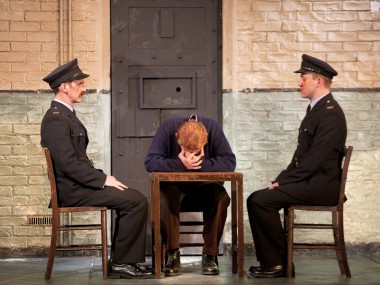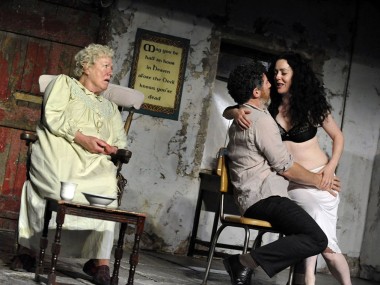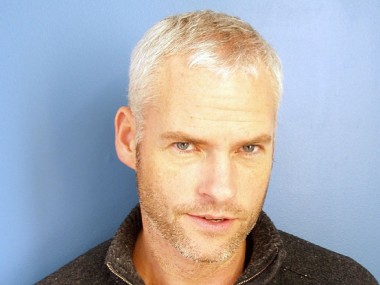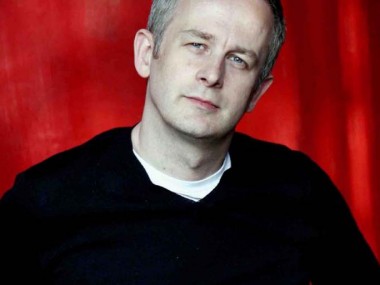Hangmen, Royal Court
Friday 18th September 2015
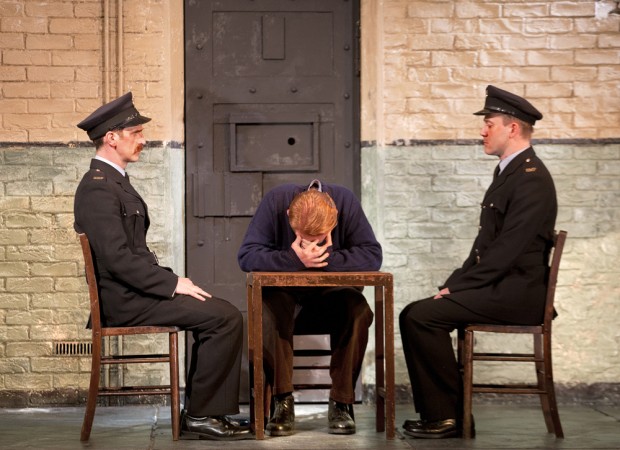
Welcome back Martin McDonagh. It’s been more than 10 years since you’ve had a play on in London, and I was beginning to think that we had lost you to Broadway, and Hollywood, for ever. As you know, I loved it when your Leenane Trilogy burst onto our stages in the late 1990s, and although I wasn’t that keen on some of the follow-ups, The Lieutenant of Inishmore (2001) and The Pillowman (2003) are among my favourite plays. I wasn’t madly impressed by your films, no, not even the highly hyped In Bruges, but your return to the stage has raised my expectations. Especially with Reece Shearsmith and David Morrissey in the cast — whoa!
The set up is immediately gripping: the first scene shows a gruesome execution in 1963. As you’d expect from a McDonagh play with the title Hangmen, the main characters are two executioners and the tone is darkly humorous. Harry, the main hangman, is played by Morrissey and with his lumbering intensity dominates the stage; his assistant Syd (Shearsmith), by contrast, is rather incompetent. The running joke is that, compared to the celebrated real-life executioner Albert Pierrepoint, the fictional Harry is the second-best hangman in England. And boy does he have a chip on his shoulder about that. Nevertheless, the two men manage to dispatch the prisoner Hennessy, who loudly protests his innocence and curses the two men. After the ghastly deed is done, the story jumps forward two years.
It’s 1965 on the day that capital punishment was abolished, and we find ourselves in Harry’s pub in Oldham. It’s a rundown, nicotine-stained and greasy place, but the publican Harry — because of his involvement in the grisly business of judicial execution — is a local celebrity, and the place has a regular clientele of cronies. Helped by his resigned wife Alice and his 15-year-old daughter Shirley, a bit of a mope, he rules the roost. Everyone, especially a local newspaper reporter, wants to know about his old job, and you can understand the fascination: Harry certainly has some tales to tell.
But what about Hennessy’s curse? When a sinister young man, the longhair Mooney, arrives from down south, Harry’s world reacts with mockery, but pretty soon this stranger becomes the prime suspect in the sudden disappearance of Shirley. After an overlong exposition scene, the story becomes one of suspense, revenge and retribution. Is Mooney a serial sex offender? Or an avenging angel? But before things hot up, as they do admittedly in the second half, I was having serious doubts about my initial enthusiasm, and my high expectations soon turned to dust. Everyone was laughing in a deluge of sycophancy, except me. Why?
Then I remembered. The problem with McDonagh is that he is in love with the sound of his own voice. As the story develops all you can hear is not the characters, but their author. And, in this play, he is at his most repetitive and most senselessly provocative. All the jokes laugh at northerners, at blacks, at women, at gays. They mock the working class; they sneer at weakness. Don’t mention the war? If only. McDonagh sticks out his tongue at Germans. At fat people. At deaf people. At one point, there’s a “cock” joke, then another, then another. Then yet another. By the end of the play, I’d had enough of cock jokes. What is so infuriating is not so much that the jokes aren’t funny (at least not to me), it’s that the characterisation is so thin. Clearly McDonagh doesn’t love his creations; and, if doesn’t care, why should we?
As depression set in, I almost forgot to pay attention to the play’s ideas. On one level, this is an attempt to recreate the lost world of the northern English working class, with its warm beer, masculine comradeship and contempt for women. As such, it is caricatured and juvenile, closer to Little Britain than (even) Coronation Street. On another level, it is a meditation on justice, but even this strand never comes to fruition, except for an offhand comment that, with unjust killing, “that’s just the way it goes, int it?” I agree that the death penalty and the issue of state justice is interesting, but McDonagh has so little of interest to say about it.
So despite some nicely twisted plotting, there is something distressingly inhuman about this play. Near the end, while all around me were pissing themselves with laughter, I recalled a phrase I’d heard — at the height of in-yer-face theatre — back in the mid-1990s: we have been dehumanised — and we’re loving it. Except that this time I wasn’t. Although Shearsmith and Morrissey deliver strong performances, and Johnny Flynn is eye-catching as Mooney, the writing feels thin to me (would this play have been put on without McDonagh’s name on it?), and I didn’t empathise with any of the deeply unattractive and poorly realised characters. Sally Rogers and Bronwyn James do their best with the female roles, and an impressive John Hodgkinson embodies Pierrepoint.
But the peurile self-indulgence of the enterprise would have been depressing if it hadn’t also made me angry. What a waste of resources. Matthew Dunster’s atmospheric but cumbersome production, on Anna Fleischle’s tenebrous set, which oozes smoke and haze, will delight anyone who is really desperate for a laugh, but it’s nowhere near McDonagh’s best work. No, it’s cynical, lazy and unpleasant. Rarely has my enthusiasm been so misplaced. For me, a hateful evening.
This review first appeared on The Arts Desk

